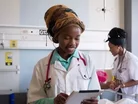Africa: improving healthcare across the region

This week the African region has seen multiple partnerships forming to improve healthcare within the region.
Modernising the healthcare system
US Agency for International Development (USAID) has partnered with the Ministry of Health to launch a new Digital Health Activity. The launch marks its continued investment in digital information solutions to strengthen the Ethiopian healthcare system and improve the quality of service. The system aims to provide full access to data, analytics and skills to improve health and well-being in Ethiopia.
In addition, USAID will partner with local universities to introduce courses that develop competencies in health innovations and electronic solutions.
“In addition to simply expanding digital health systems and strengthening the skills of today’s medical professionals, we are also increasing our focus on developing the leaders of tomorrow to drive health innovations far into the future,” commented, Sean Jones, USAID Mission Director.
Did you know? USAID signed a recent partnership deal with NCB to stimulate SME growth.
SEE ALSO:
-
AfDB approves US$31.3mn water and sanitation facilities grant
-
Read the latest issue of Business Chief, Africa edition, here
Accelerating medical training
The Ministry of Health in the Democratic Republic of the Congo (DRC) has partnered with the World Health Organisation (WHO), to train the country's first national emergency medical units for epidemics.
Those participating are being trained to manage health emergencies such as, effective implementation of public health actions and post epidemic reviews.
The increase in training is a government response to ongoing epidemics in the country to increase its response capacity, both regionally and nationally. Frequently, the DRC experiences epidemics, such as cholera, measles, yellow fever and Ebola.
“Capacity building in emergency interventions represents for our country a priority and a crucial step. After this training, the very first emergency medical unit will be deployed immediately for the response to the current measles outbreak, which is affecting the entire country,” said Dr Laurent Singi-Li-Mobutu, Assistant Director for the National Programme for Emergencies and Humanitarian Action.
“It is both urgent and important to have better-trained emergency medical technicians who will be able to bring about improvements in public health interventions to ensure that those affected by epidemics urgently receive the best care possible,” said Dr Deo Nshimirimana, interim WHO Representative in the DRC.
For more information on business topics in the Middle East and Africa, please take a look at the latest edition of Business Chief MEA.
Featured Articles
SAP has announced it has appointed a new President for a newly-created EMEA region, aiming to make the most of the opportunities of cloud and AI technology
Technology giant SAP has expanded its portfolio with the acquisition of LeanIX, a leader in enterprise architecture management (EAM) software
To help businesses achieve increased productivity, Siemens and Microsoft are deepening their partnership by showcasing the benefits of generative AI

